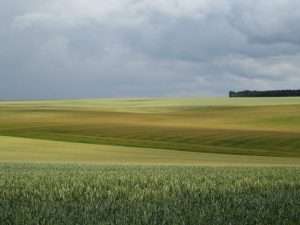Some Somme thoughts
Being born in 1960 and growing up in the English West Country, stories of the Second World War were still fresh, veterans were all around, my own grandfather had been a London fireman during the Blitz. To a schoolboy, there was some sense in the war fought between 1939 and 1945, it was against the aggression of Adolf Hitler and his allies, it was against the great evils he threatened to bring upon the whole world. The Second World War made sense, insofar as any war made sense.
The First World War was different, though, it was hard to understand how it had happened in the first place and hard to understand how the years of awful carnage were allowed to continue. My mother was a keen reader of royal biographies and would explain how the monarchs of the opposing countries were related; if that was the case, why did they engage in such an awful conflict? My thinking was further coloured by Richard Attenborough’s satirical musical, “Oh, what a lovely war;” the terrible losses of the First World War were depicted as the consequence of idiotic leadership, lions had been led by donkeys, or so we were told.
Moving to live in Northern Ireland in the 1980s, I encountered a version of history in which the First World War had a hugely important place, an understanding of history that placed great emphasis upon the Battle of the Somme. History was imbued with huge religious symbolism shaped by a 19th Century spirituality in which both Roman Catholics and Evangelical Protestants emphasized blood sacrifice. While Irish nationalists saw the Easter Rising in Dublin at Easter 1916 as being the blood sacrifice that bought their freedom; in Loyalist communities in Northern Ireland, the liberating blood sacrifice was made by the men of the 36th (Ulster) Division on 1st July 1916.
Being someone who regarded the Sermon on the Mount as at the heart of Jesus’ teaching, thinking that being a peacemaker was what Jesus expected, I recoiled at traditions that exalted violence: how could one claim to be a Christian and delight in military conflict? The First World War seemed part of a history I would prefer to avoid.
Strangely, it was moving to Dublin that prompted questions. There was a brass war memorial plaque on the wall at the back of the church, it bore the names of ten young men, three of whom had died on 1st July 1916. The Battle of the Somme was obviously a much more complex affair than I had imagined. One name, that of Private Percy Horner, became the focus for investigating the story of those men and the horrific battle in which they fought. Percy Horner was twenty years old, I knew where he lived, I knew where he went to school, I knew the story of his family. Percy Horner disappeared completely on that first day of the Somme, blown to pieces or buried under tons of earth. His only memorial is his name being inscribed on the memorial arch at Thiepval and on the plaque at the back of that church. What had Percy Horner’s war been about?
I began visiting in the Western Front in the year 2000; in 2010, I began to take groups of church people to the Western Front. There was a need to try to provide some interpretation, some meaning for Christian people, for how could we pretend to believe in a Sovereign God if we simply pretended moments that changed history were nothing to do with him?
But what meaning was there? Stand in any of the countless cemeteries and attempt an explanation and whatever words one uses are at best trite and simplistic, and are invariably wrong. Our Western Front visits have included moments to stand and read passages of poetry or prose, and it was in such moments there has been a sense of something different. The people with the task of trying to give meaning to those awful events as they took place were the army chaplains, two of whom were well known writers. The Revd Geoffrey Studdert Kennedy and Fr William Doyle SJ came from different traditions, but shared a common approach in attempting no explanation of the horrors, and asserting no faith in a God other than one who was with us in our suffering. A century later, their writings remain the best Christian perspective on the horrors of that July a hundred years ago.



Just a few observations.
You can read as many books as you like but until you arrive in Diksmuide, Ypres or Arras in November or December and feel the surgical wind off the Urals cutting you you have little notion of the exposed existence those men went through during those years. We normally turn up in August when finding a bit of shade is our goal, and when walking about those ordered CWGC is a chore.
The thing that strikes a person who knows these islands is the featurelessness of the landscape. You realise but for the ditches and trees the highest thing in the region would be the spires of the churches.
You are a bit amazed that the town of Ypres every evening stop traffic on one of the main routes when the fire brigade renders respect to those under the ground surrounding that town, who have yet to be found.
My ex, from Belgium, was shocked that the list of names in those alcoves of the Peace Tower were in place year on year and hadn’t been stolen or destroyed. In fact I think that was the beginning of the end for us. I simply wouldn’t think anyone would destroy them.
Analysis in Ireland shows the class based nature of those that joined the army/navy.
Analysis shows that the Irish regiments were rotated into the line with greater rapidity than the English, but pretty much the same as the Scots. I feel this gave rise to the feeling that Ireland was doing more than her share.
You have to wonder if the clergymen were aware that as a tool of force morale, the army was well aware of their use.
Nice to see MDH at the THIEPVAL MEMORIAL. They could’ve given the Presidential salute though.
Percy Horner
Michael Goodwin
David Goodwin
Samuel Treacy
We will remember them, thank you Ian.
I wouldn’t disagree. some padres were undoubtedly cheerleaders for the cause.
The Irish Roman Catholic chaplains were an interesting anomaly, they were seconded to the army, not part of its structure. Because they were not under army command they ignored orders that chaplains should not to go forward with the men, thus Willie Doyle gained a wide reputation as one who was unafraid to be in the midst of the conflict.
The piece was written to go with a programme broadcast on Friday:
http://www.premier.org.uk/Across-the-UK/Northern-Ireland/God-With-Us